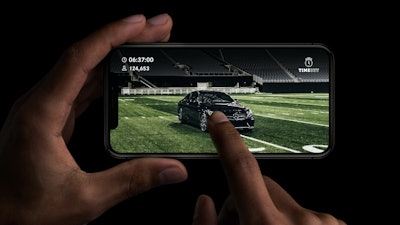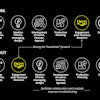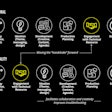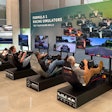
When Mercedes-Benz USA sponsored a smartphone-based Last Fan Standing game during Super Bowl LII in 2018, servers couldn't handle the load. When the game relaunched three hours later, fans eager to win a Mercedes-AMG C 43 Coupe crashed the system again. While massive data from smartphones continues to challenge wireless network providers, new plans for 5G aim to support mass data services, much like Last Fan Standing.
“5G is going to transform the approach to data-driven solutions in the face-to-face meeting business,” says Richard Torriani, chief operating officer of MCI Group in Switzerland.
1. The technology will power a more customized events experience.
Torriani says the technology will power a more customized journey, for example, through personalized suggestions for how to consume a conference. This could include who attendees should meet, what content they should attend, and coordinating sales through a virtual environment—all in an effort to increase ROI.
2. 5G will make room for services that were previously cost-prohibitive or ineffective.
5G will also enable services that were cost-prohibitive or didn’t work well before, such as live video transmission and mass-scale immersive augmented reality with real-time interactions, says Torriani. According to Torriani, 5G will start making a substantial impact on meetings and tourism in three to five years, once it’s built a critical mass. “It’s going to be a unifying connectivity like electricity—in almost no time we will not be able to do without that flow of information,” he says.
3. The new network will be able to support multiple devices simultaneously, minimizing room for error.
With the improvements, a vast number of devices can be supported simultaneously in a small area, which applies directly to indoor use at conferences and congresses. To meet the demands of the 5G era, networks rely on short wavelength and high-frequency signals, and require a dense deployment of nodes near the user.
That's where wireless pros like Los Angeles-based Boingo come into play. “5G is not one-size-fits-all,” says Dr. Derek Peterson, chief technology officer at Boingo. “To take advantage of all available spectrums in the 5G era—licensed, unlicensed, and shared—venues should consider adopting neutral host business models.”
4. It's already being put into action for test-runs.
Boingo takes a convergence approach, applying a mix of cellular 5G, Wi-Fi 6, and other spectrums to support enhanced demands. It’s currently working with Verizon to deploy 5G in indoor venues and announced in October the deployment of a 5G-ready distributed antenna system and Wi-Fi network at Louis Armstrong New Orleans International Airport.
Last November, Barcelona piloted a trial along the iconic Passeig de Gracia, enabling visitors to explore the interior of monuments or shop virtually using 5G-enabled mixed-reality headsets. Other pilot projects include Cruilla, the first 5G festival in Europe that took place July 8-10 (postponed from June due to COVID-19), where 3D virtual headsets gave attendees a 360 experience of the show as seen from the stage.
The city of Peachtree Corners, Ga., sponsors Curiosity Lab—a testing ground for technology—as part of an economic development initiative within a 500-acre technology park. The highlights include a 1.5-mile autonomous vehicle test track and a smart city laboratory. Its Sprint True Mobile 5G network allows companies to test intelligent traffic signals and smart street lights, along with future applications including “internet of things” devices, drones, and robotics.
This story first appeared on Connect (BizBash's parent company) here.



















